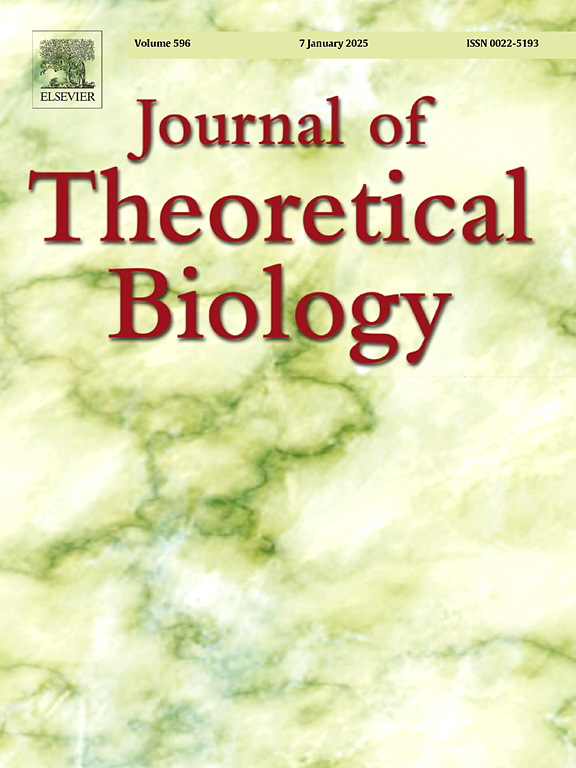Energy constraints and neural strategy transitions in Alzheimer’s: A game-theoretic model
IF 2
4区 数学
Q2 BIOLOGY
引用次数: 0
Abstract
While many mechanisms have been proposed to drive Alzheimer’s disease, particularly the accumulation of amyloid plaques and hyperphosphorylation of tau proteins, emerging evidence suggests that they may be the byproducts of earlier damage rather than initiating events. Instead, metabolic dysfunction and the inability of neural cells to support their energetic demands may be a more plausible trigger for subsequent pathological cascade (the neuron energy crisis hypothesis). Here we highlight how type 2 diabetes (T2D) can contribute to neurodegeneration by impairing brain energy metabolism. We present a game-theoretic framework, where neurons face trade-offs between energy efficiency and information fidelity. We show that under metabolic stress, neural networks can evolve toward smaller group sizes that prioritize energy efficiency over information quality, which may underlie the observed collapse of cognitive capacity during neurodegeneration. We conclude with a discussion of interventions, ranging from antidiabetic drugs to cognitive engagement and sensory stimulation, aimed at reducing metabolic stress and preserving cognitive function.
阿尔茨海默病的能量约束和神经策略转换:一个博弈论模型。
虽然已经提出了许多驱动阿尔茨海默病的机制,特别是淀粉样斑块的积累和tau蛋白的过度磷酸化,但新出现的证据表明,它们可能是早期损伤的副产物,而不是初始事件。相反,代谢功能障碍和神经细胞无法支持其能量需求可能是随后病理级联反应(神经元能量危机假说)的更合理的触发因素。在这里,我们强调2型糖尿病(T2D)如何通过损害大脑能量代谢来促进神经变性。我们提出了一个博弈论框架,其中神经元面临能量效率和信息保真度之间的权衡。我们表明,在代谢压力下,神经网络可以向更小的群体规模进化,优先考虑能源效率而不是信息质量,这可能是神经变性期间观察到的认知能力崩溃的基础。我们最后讨论了干预措施,从抗糖尿病药物到认知参与和感官刺激,旨在减少代谢应激和保持认知功能。
本文章由计算机程序翻译,如有差异,请以英文原文为准。
求助全文
约1分钟内获得全文
求助全文
来源期刊
CiteScore
4.20
自引率
5.00%
发文量
218
审稿时长
51 days
期刊介绍:
The Journal of Theoretical Biology is the leading forum for theoretical perspectives that give insight into biological processes. It covers a very wide range of topics and is of interest to biologists in many areas of research, including:
• Brain and Neuroscience
• Cancer Growth and Treatment
• Cell Biology
• Developmental Biology
• Ecology
• Evolution
• Immunology,
• Infectious and non-infectious Diseases,
• Mathematical, Computational, Biophysical and Statistical Modeling
• Microbiology, Molecular Biology, and Biochemistry
• Networks and Complex Systems
• Physiology
• Pharmacodynamics
• Animal Behavior and Game Theory
Acceptable papers are those that bear significant importance on the biology per se being presented, and not on the mathematical analysis. Papers that include some data or experimental material bearing on theory will be considered, including those that contain comparative study, statistical data analysis, mathematical proof, computer simulations, experiments, field observations, or even philosophical arguments, which are all methods to support or reject theoretical ideas. However, there should be a concerted effort to make papers intelligible to biologists in the chosen field.

 求助内容:
求助内容: 应助结果提醒方式:
应助结果提醒方式:


